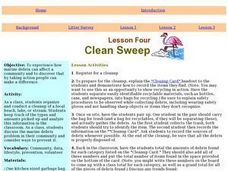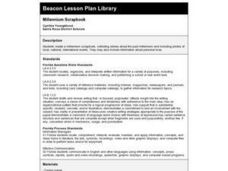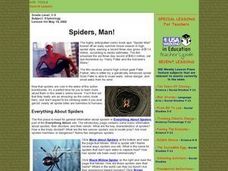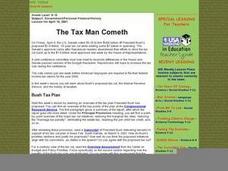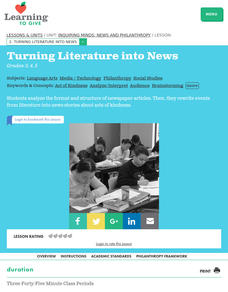Curated OER
Clean Sweep
Students organize and conduct a cleanup of a local beach, lake, or stream. They keep track of the types and amounts picked up and analyze this information in the classroom.
Curated OER
Choosing an Appropriate
Students use the classified ads of a local newspaper and read descriptions of people's goals, interests, experience, and skills, then find an appropriate employment ad for that person. Next, they find an appropriate ad for themselves.
Curated OER
Millennium Scrapbook
Third graders create a millennium scrapbook, collecting stories about the past millennium and including photos of local, national and international events.
Curated OER
Meteorology
Seventh graders examine the job of meteorologists. They decide which characteristics of the atmosphere that meteorologists focus on. They use local weather maps from newspapers to predict weather in their area.
Curated OER
Online Collaborative Social Studies Lesson Plan
Students create newspapers and post them online for others to see.
Curated OER
Spiders, Man!
Learners conduct online research to learn more information about spiders. They take a current issue of their local newspaper and add spiders to the pictures where spiders might live.
Curated OER
Cows in Crisis
Young scholars study mad cow disease and how it has affected the lifestyles of many Europeans. They examine local cattle industry and look for steer- or cow-related products. They organize information they find and present it to the rest...
Curated OER
The Tax Man Cometh
Students examine websites and resources related to Bush's 2001 tax plan. They discuss the history of taxes and other tax topics. They look for evidence in the local newspaper of government spending at work.
Curated OER
Writing to Focus Reading and to Imagine Researching
Students examine several elements that would cue them into a newspaper article about community change without reading the main copy text. They discuss the details and write notes about the article. They first skim and then thoroughly...
Curated OER
Journalism: Following Your Lead
Students, in groups, identify the components of news article lead sentences. They visit other classrooms and take notes identifying the lead components on the lesson. Students search local and national newspapers for leads that grabbed...
Curated OER
Shame on You!
Should public humiliation be an acceptable consequence for a crime? Have your middle schoolers engage in a round table discussion about the recent resurgence of the use of public humiliation as a punishment for crimes in the United...
MENSA Education & Research Foundation
I Need a Superhero
Once the class learns about the hero's journey, they'll find it in every story and movie they see! Take characters from their humble beginnings to their atonement and apotheosis with a set of lessons about the hero's journey...
Curated OER
Turning Literature into News
Students analyze the format and structure of various newspaper articles. Then, they rewrite events from literature into news stories about acts of kindness.
Curated OER
Not Getting the News about the Stamp Act
How did American colonists react to the Stamp Act of 1765? Your young historians will examine primary source material by reading excerpts from a transcription of the Pennsylvania Gazette and then identifying the sentiments expressed...
Curated OER
Persuasive/Argumentative Essay vs. Opinion writing
Reinforce persuasive and argumentative writing skills with this lesson, which utilizes SchoolNet News Network's website/SNN Monthly magazine. Young writers review journalism writing styles that help them explain that writing a persuasive...
Curated OER
During Reading Strategy: Literary Newspaper
Add some writing to your class's reading of Cold Sassy Tree! With this plan, readers assume the role of journalist and create a segment of a paper with their peers. Suggested segments are included, and a worksheet dividing the text into...
Curated OER
Take a Deep Breath: Air Today, Air Tomorrow
This is the introductory instructional activity in a series about air quality. Why is it so important that we breathe clean air? How can we make sure we're keeping our air clean? A discussion is the central idea of the instructional...
Curated OER
Understanding Weather and Climate Patterns
Students research the climate patterns of various locations and make predictions based on their findings. They determine the importance of latitude and longitude in weather and climate. Students create graphs displaying their collected...
Curated OER
Creative Ways To Teach Evolutionary Concepts
Research how DNA, the genetic blueprint of living organisms, plays an essential role in the continuity of life. High schoolers will summarize how their influence may very well effect the destiny of the population from one generation to...
Curated OER
Come Fly with Me . . . Open a Book: Travels through Literature
This detailed overview of a curriculum unit suggests using travel literature to engage and stimulate your third graders’ interest in reading. The suggested reading list includes fiction and non-fiction materials and offers urban children...
Discovery Education
Make it all Better!
Discover how innovations can help your school and community. In the three-part STEM lesson, scholars learn the meaning of innovation and brainstorm innovations in their schools. They identify issues in their communities and think of...
Curated OER
Political Cartoons
Students examine a variety of historical cartoons. They recognize a political cartoon and identify the main idea, symbolism, exaggeration and caricature in political cartoons. Students analyze a political cartoon by Benjamin Franklin.
Curated OER
Celebrating Caring and Kindness
Students create a poster that represents how to care and give kindness. In this caring and kindness lesson plan, students demonstrate character development by creating a poster in groups on how they can care and be kind at home, school,...
Curated OER
Government
Second graders run for various offices. They dress up like a politician, pretend to be running for an office, and tell the students why they should vote for him/her. They explain why it is necessary for a community to have a government


